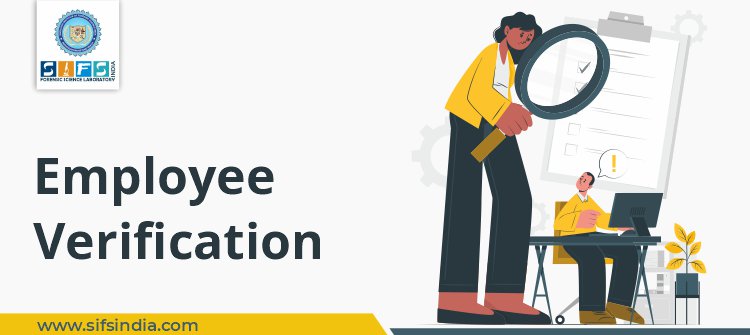Employee background verification services play a crucial role in maintaining workplace safety.
SIFS India understands the Indian business dynamics and offers help to organizations in eliminating the candidate profiling and verification workload and helping them make informed hiring decisions.
The companies use these employee verification reports to authenticate an individual's identity before hiring.
Services Our Organization Provides:
Academic Verification: It is done to ensure the accuracy of educational credentials, helping organizations to have genuine academic details about potential hires.
Alcohol & Drug Abuse Check: A strict screening process is carried out to detect alcohol and drug abuse issues and ensure workplace safety.
Credit Report: It involves evaluating a candidate’s credit history to gain insights about his trustworthiness in making informed decisions regarding financial roles or sensitive positions.
Criminal Verification—Court: A thorough examination of court records is done to verify an individual's criminal history to help employers make informed decisions about potential hires.
Criminal Verification—Police: An in-depth examination of police records is done to gain insights into an individual's criminal background and the risks associated with hiring them.
CV Validation: The curriculum vitae details of candidates are examined to ensure the truthfulness of the information provided by them.
Employment History Check: Candidates’ professional experience is verified to ensure that the information presented in their resume is correct.
Fingerprinting: Fingerprint analysis techniques are used to verify an individual's identity in sensitive employment contexts.
Form 16 Verification: Form 16 is validated to confirm the accuracy of an individual's income and tax-related information.
Gap Verification: Candidates’ professional timeline is verified to highlight any gaps, ensuring transparency about employment history.
Global Database Verification: Information is cross-referenced against global databases to ensure the authenticity of details provided by candidates. It is helpful in international hiring scenarios.
Identity Verification: A verification process is carried out to confirm the identity of individuals to safeguard organizations against identity-related risks.
Integrity Check: A comprehensive assessment of an individual’s ethical standards is done so that candidates whose values align with those of the organization get hired.
License Check: It involves verifying and authenticating the professional licenses and certifications to ensure compliance and competence in regulated industries.
Neighbor Check: Random checks are done with neighbors to gather insights into an individual's personal conduct and behavior.
Permanent & Present Address Verification: This is done to ensure that the information provided aligns with official records for secure and reliable hiring.
Personal ID Check: Personal identification documents are verified to ensure their legitimacy, providing overall security during the hiring process.
Pre-employment Verification: A detailed screening including various verification checks to assess an individual's suitability for a specific role.
Professional Reference Check: Previous employers or colleagues are contacted to validate the professional competence and character of a candidate.
Psychometric Check: Psychometric assessments help in evaluating an individual’s personality traits and behavioral tendencies, helping gain insights into whether they are fit for the role they applied for.
Social Media Profiling: Online activities and profiles of candidates’ across social media are analyzed to gain insights into their character and potential risks.
Financial Records: Individuals' financial records are evaluated to gain insights into their financial history, helping employers make informed decisions in roles with financial responsibilities.
Politically Exposed Persons: It involves identifying individuals with political exposure to assess potential risks, particularly relevant in roles involving high levels of reliability and transparency.
Sanction Lists: Cross-referencing is done against sanction lists to identify individuals with links to prohibited entities to ensure compliance with regulatory standards and minimize organizational risk.


